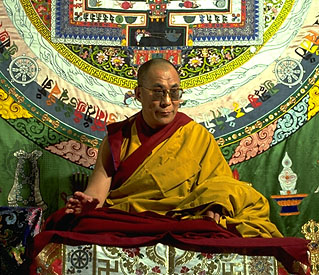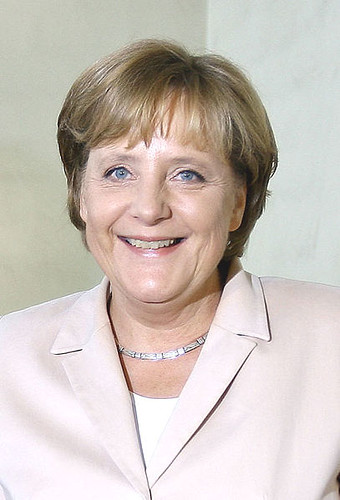Yelling is a mistake, but it is one that can be overcome, when there is a will.
There are any number of reasons why one might yell. They might be frustrated, and feel they have exhausted other ways of delivering a message. Or they might feel that it is appropriate, and expected.
But, it is always a mistake. Outside of the army, where discipline needs to transcend common sense if one is to stay alive, yelling tends to confuse a message and confound a listener.
===
Angela Merkel visits Israel, and is acknowledged as being a steadfast friend of the only established liberal democracy in the Middle East. A far cry from when the radical right wing killed six million jews a mere sixty years ago.
===
The Dalai Lama asks for help for his people in Tibet, who have long been under the murderous oppression of Chinese communists.
One might belittle conservatives of the West over any of many different issues, even claiming that the face of a wife might only be interesting in the first year of a marriage. However, it is to these people whom the Dalai turns.
===
Yelling is a mistake, but when one wishes to, they can face their mistakes.
Monday, March 17, 2008
Recovering From Yelling
Subscribe to:
Post Comments (Atom)

2 comments:
German leader visits Israel
from news.com.au
ANGELA Merkel overnight began a highly symbolic visit to Israel, where she will become the first German chancellor to address its parliament more than 60 years after the Nazi Holocaust that killed six million Jews.
"I am grateful we can open a new chapter in relations between our two countries," Ms Merkel said at a red carpet ceremony at Tel Aviv's Ben-Gurion airport.
Welcoming Ms Merkel, Israeli Prime Minister Ehud Olmert praised her "unflinching support" for the Jewish state and described the German leader as a "strategic ally".
Before embarking on her three-day trip, Ms Merkel called on Iran to halt a nuclear program which Israel has described as a threat to its existence. Tehran denies it is seeking to build atomic weapons.
"The threats to which the Israeli state is exposed are also threats to us," Ms Merkel said in her weekly podcast yesterday.
German officials said the chancellor's visit, on the Jewish state's 60th anniversary year, is intended to help further normalise relations between Germany and Israel.
The visit will strike strong emotional notes.
Later in the day, Ms Merkel was to fly to the southern burial site of Israel's first prime minister, David Ben-Gurion.
Tomorrow, she will lay a wreath at Yad Vashem, Israel's Holocaust memorial in Jerusalem. Later that day Ms Merkel and several government ministers accompanying her will participate in a joint meeting with Olmert and his cabinet.
Ms Merkel, 53, Germany's first chancellor to be born after World War Two, will address the 120-member Knesset, or parliament, on Tuesday, in German.
One legislator, Arieh Eldad of the right-wing National Union party, threatened to walk out of the session after a parliamentary committee voted overwhelmingly to give Ms Merkel special dispensation to speak.
Under Knesset bylaws only foreign leaders who are heads of state can address the assembly.
"Probably the last words my grandmother and grandfather heard was the order, in German, to open fire (at them)," Mr Eldad, 57, told Israel Radio, describing the German language as "painful" to his ears.
But 63 years after the end of World War Two, Germany is widely regarded in Israel as its best friend in Europe. German cars and other products are prevalent and Germany is a popular tourist destination for Israelis.
In a milestone gesture in 2000, Johannes Rau became the first German president to address the Knesset. Speaking in German, he asked for forgiveness for crimes committed by Germans against Jews.
Some commentators say Ms Merkel has been less vocal in her public criticism of Israel than her predecessor, Gerhard Schroeder, on issues including military action against Palestinians in the Israeli-occupied West Bank.
Last month, Mr Olmert visited Berlin, where Iran was high on the agenda of his talks with Ms Merkel. Officials said the issue would also be discussed at their meeting tomorrow.
Germany joined the five permanent UN Security Council members Russia, the United States, France, Britain and China earlier this year in circulating a proposal for a third sanctions resolution against Iran, which the Council approved this month.
Tehran says its uranium enrichment is part of a program intended only to produce electricity.
We need help, says Dalai Lama
By Karl Malakunas
THE Dalai Lama has called for an international investigation into the "cultural genocide" taking place in his homeland of Tibet.
Speaking from his exiled base in Dharamsala, India, the Dalai Lama overnight launched a scathing criticism of China's decades-long rule of Tibet.
"Whether intentionally or unintentionally, some cultural genocide is taking place,'' the 1989 Nobel Peace Prize winner said.
"They simply rely on using force in order to simulate peace, a peace brought by force using a rule of terror.
"Please investigate, if possible ... some international organisation can try firstly to inquire about the situation in Tibet.''
Protests spread to China
Police yesterday opened fire on Tibetan protesters as anti-Chinese rallies spread outside of Lhasa.
The fresh outbreak of unrest, in southwest China's Sichuan province, reportedly left seven people dead in a dangerous escalation of a nearly week-long uprising by Tibetans against China's rule of the Himalayan region.
The protests, previously confined mainly to the Tibetan capital of Lhasa, have presented China with a huge domestic crisis just as it is trying to present an image of harmony and peace ahead of the Beijing Olympics.
Repeated gunfire
Foreigners in Lhasa have reported a massive security presence still in place as China declared a "people's war'' in Tibet to end what has become the biggest uprising against Chinese rule in nearly 20 years.
Foreigners who flew out of Lhasa reported hearing repeated gunfire, with armed soldiers patrolling every street.
"I heard muffled gunshot fire. There was no question about it,'' tourist, Gerald Flint, a former US marine who runs a medical non-government organisation, said at Chengdu airport in Sichuan.
Mr Flint said security forces poured into Lhasa yesterday but that there was still "chaos'' on the streets.
The worst reported violence occurred on Friday, when Tibetans rampaged through Lhasa, destroying Chinese businesses and torching police cars.
Eighty people have been confirmed dead, the Tibetan government-in-exile said, contradicting the official account in China's state-run media that there were just 10 fatalities.
"No mood to compromise"
Despite being under intense international pressure to show restraint, China's communist government indicated it was in no mood to compromise on anti-Chinese elements in Tibet.
"We must wage a people's war to beat splittism and expose and condemn the malicious acts of these hostile forces and expose the hideous face of the Dalai Lama group to the light of day,'' the Tibetan Daily said.
"This grave outburst of fighting, destruction and burning was planned by reactionary separatist forces both within and outside our borders to smash the social order with the ultimate goal of an independent Tibet.''
China sets deadline
China has set a deadline of Monday at midnight for those involved in the demonstrations to surrender.
Tibetan rights groups said the protests - which marked the anniversary of the failed 1959 uprising - were an outpouring of frustration at decades of brutal Chinese rule.
China sent troops into Tibet in 1950 to "liberate'' the region and officially annexed it a year later.
The Dalai Lama won the Nobel Peace Prize in 1989 for his peaceful resistance to Chinese rule and insists he does not want independence for Tibet, but rather greater cultural autonomy and an end to repression.
The events in Tibet have led to protests in other parts of the world, with Tibetan communities in Australia, India and Japan staging protests.
Post a Comment